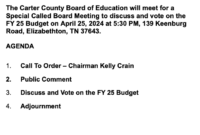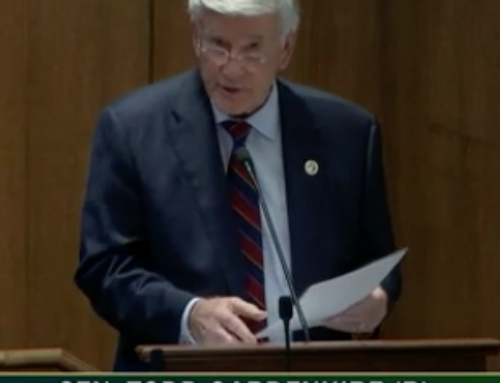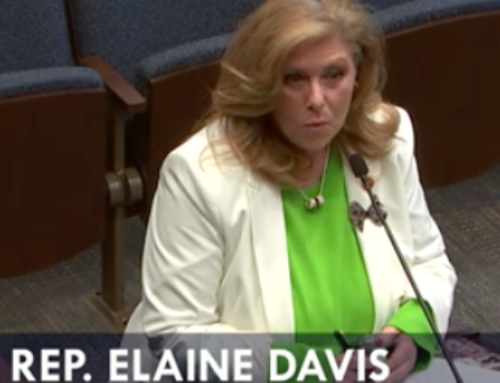Carter County school board leaves off its agenda its vote to close elementary school
The Carter County School Board voted 6-1 to close an elementary school in a special called meeting on April 25, but didn’t let the public know in advance in its meeting notice.
The vote to close the Little Milligan Elementary, which the school director said had only 69 students, has parents upset and even more so because the school closure vote was planned without giving them advance warning. Their students will be assigned to a new school which the school district said would require a 45-minute bus ride.
One county commissioner who attended the meeting told the school board that parents were not given enough time to discuss the school board’s plan, according to an article in the Elizabethton Star. “Don’t just spring it on them,” said county commissioner Donnie Cable.
News reports about the vote also appeared in the Johnson City Press and WJHL in Johnson City.
The notice likely did not satisfy legal requirements for public notices of special called meetings. The Court of Appeals has ruled that to provide adequate notice of a special called meeting, a governing body must “reasonably describe the purpose of the meeting or the action proposed to be taken” in its notice and cannot take up action other than what is specified in the notice.
In this case, the notice included only an item to “Discuss and Vote on the FY 25 Budget,” which the school board also did after voting to close the school.
Court of Appeals outlines adequate notice for special called meetings

The agenda / notice for the special called meeting in which school board members voted to close a school has no mention of a vote to close a school. The only agenda item for action was a vote on the budget. This likely violates the law on notice for special called meetings.
The three-pronged test for adequate notice for special called meetings was developed in 1999 in the case, Englewood Citizens for Alternate B v. The Town of Englewood.
The Englewood meeting notice shares some characteristics with the Carter County school board notice.
The Englewood case dealt with a town commission meeting in which the meeting notice was hung on the walls of a bank, at City Hall, and the post office, and faxed to the local newspaper — all within 48 hours of the meeting.
The meeting was to choose a route for a proposed highway bypass in the East Tennessee town, something of great interest to many citizens, but the posted agenda did not say that. It only said: “1. Letter to State concerning HWY 411”.
The Court of Appeals voided the action of the town commission and provided criteria to judge future notices of special called meetings.
- Notice must be posted in a location where a member of the community can become aware of such notice.
- The contents of the notice must reasonably describe the purpose of the meeting or the action proposed to be taken.
- The notice must be posted at a time sufficiently in advance of the actual meeting in order to give citizens both an opportunity to become aware of and to attend the meeting.
The appeals court ruled the town council’s actual notice was “misleading” to the public and that 48 hours notice before a meeting was “not sufficient enough to fairly inform the public under these circumstances.”
“Without meeting all three of these requirements, we fail to see how the Town of Englewood could provide adequate public notice for the purposes of a special meeting,” the court said.
What’s next for Carter County’s Little Milligan school?
Director of Schools Brandon Carpenter told school board members that the cost to run the school for one year equates to about $16,871 for each student compared with the cost per student at the county’s largest school of $6,837.
According to news reports, Carpenter had originally presented a new fiscal year budget that didn’t include a school closure.
Despite the lack of notice, some parents did hear through the grapevine that a vote might be taken to close the rural school and showed up at the meeting. They talked of the academic achievements of its students and said the students have benefited greatly from the small student population.
In the end, only one school board member voted against closing the school — the chairman of the board, Kelly Crain, who represents the district with the school. “I told the people of my district 16 years ago that I would not vote to close Little Milligan and I have kept my word,” he said, as reported in the Johnson City Press.
While the notice of the meeting likely violated state law, the only way to challenge the vote would be to file a petition in court. If a judge found the school board violated state law on adequate notice, he could order the vote to be nullified. The school board would be allowed to “cure” its violation by holding another meeting in which members of the public could be heard, and voting on the issue again. The school board also could nullify its own vote without court intervention and start the process over, this time in compliance with the state open meetings law.
Meanwhile, some parents are trying to determine whether they will send their children to their new appointed new school, Hampton Elementary. While the school district said the bus ride for students would be about 45 minutes, many parents said they believed it would be even longer, according to the Elizabethton Star.




